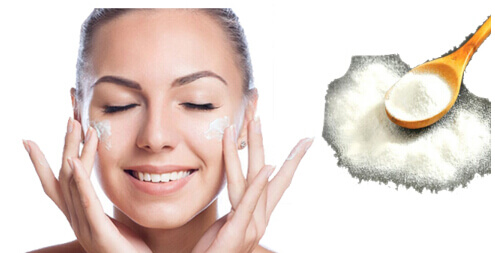How is Sodium Hyaluronate Used For In Cosmetics
Sodium hyaluronate is the sodium salt of hyaluronic acid. It is a glycosaminoglycan and long-chain polymer of disaccharide units of Na-glucuronate-N-acetylglucosamine. It can bind to specific receptors for which it has a high affinity.
The polyanionic form, commonly referred to as hyaluronan, is a visco-elastic polymer found in the aqueous and vitreous humor of the eye and in the fluid of articulating joints.
Hyaluronic acid(HA) is a straight-chain macromolecular mucopolysaccharide composed of repeat disaccharide units of glucuronic acid and N-acetylglucosamine. It widely consists of the extracellular space of human and animal tissue, vitreum, umbilical cord, skin joints synovia, and cockscomb, etc.
Most cosmetic manufacturers make use of high molecular weight HA. This ingredient, when used at optimal levels of inclusion, is an incredibly effective moisture-binding element, providing superficial hydration of the epidermis for many hours. However, this ingredient is a macro-molecule and is too large to penetrate into the deeper layers of the skin.

Low molecular weight HA, on the other hand, has been engineered to exist as a far smaller molecule that is able to penetrate through the epidermis to provide deep hydration. It has been scientifically proven that increased levels of hyaluronic acid in the deeper layers of the skin actually stimulate the production of collagen fibers, which in turn will result in a firmer, more toned appearance.
HA is a new biological at home and abroad. Its molecular weight is from several ten thousand to several million. Its aqueous solution has outstanding moisture-keeping ability, high viscoelasticity, and lubricity. It is widely used in cosmetics, pharmacy and health, and beautiful food.
Biochemical drugs with high clinical value, are widely used in all kinds of eye surgery, such as crystal implantation, corneal transplantation, glaucoma surgery, etc.
It can also be used to treat arthritis and accelerate wound healing.
It is used in cosmetics, it can have a unique skin protection effect, can keep skin moist and smooth, delicate, soft, and elastic, has anti-wrinkle, beauty care, and restore the skin physiology function.
1. Food supplements:
Hyaluronic Acid Powder through oral administration after digestion absorption, increases in vivo Hyaluronic Acid synthesis of the precursor, causing the skin and other organizations’ Hyaluronic Acid resultant quantity increases, thus enabling the skin the water retention property to increase, gaining rich elasticity, and reducing wrinkles.
2. Cosmetics applications:
Hyaluronic Acid Powder has an outstanding moisture-keeping ability, thus called the Natural Moisturizing Factor in the world. Hyaluronic Acid is a common ingredient in skin-care products, which can be used as a very effective topical humectant, which can be used for facial wrinkles, reduction of folds and wrinkles, and removal of scars.
3. Medical applications:
Hyaluronic Acid Powder could be used in eye surgery, such as corneal transplantation, cataract surgery, glaucoma surgery, and surgery to repair the retinal detachment.


